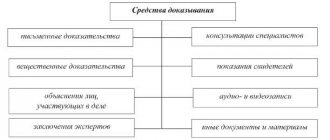In order to be used as the basis for making a decision, evidence must have a number of properties (Part 1 of Article 88 of the Criminal Procedure Code of the Russian Federation):
- relevance – connection with the subject of proof;
- reliability – connection with the established fact;
- admissibility – connection with the procedural form.
Note 1
In the assessment process, each evidence is given strength and significance depending on its place in the system of evidence; the body of evidence must be sufficient to make a decision.
Relevance of evidence
The relevance of evidence means:
- its direct or indirect connection with the circumstances that are subject to proof (the main or intermediate fact). Evidence must contain information that is important to the case, i.e., have a connection with the crime event;
- its suitability for establishing a fact included in the subject of proof. At the same time, during the process of proof, the assessment of the relevance of specific evidence may change.
Are you an expert in this subject area? We invite you to become the author of the Directory Working Conditions
Relevant evidence can both establish the main fact and refute the existence of circumstances to be proven. According to this criterion, evidence is divided into
- acquittal (absence of event, corpus delicti, non-involvement);
- accusatory (existence of an event, corpus delicti, involvement and guilt).
Errors in determining the relevance of evidence:
- inclusion in the evidence system of information not related to the subject of proof;
- misinterpretation of relevant evidence when it relates to a fact that is unable to be established.
Concept of evidence assessment
Each evidence must be assessed from a legal point of view. The assessment of evidence is considered the final stage of the investigation, a mental activity during which each protocol, each material and object attached to the case is evaluated.
There are often cases when evidence collected during an investigation or inquiry was declared illegal. It is possible to prove a person’s guilt or involvement in a crime committed only with the help of information collected in full and recorded in a certain way.
Admissibility of evidence
Admissibility in criminal proceedings means:
- guarantee of the reliability of the information received;
- compliance of evidence with moral and legal standards;
- a set of legal requirements that evidence must comply with;
- an institution of constitutional and criminal procedural law that ensures fair justice while respecting the rights of the accused.
Functions of the rule on the admissibility of evidence:
Finished works on a similar topic
Course work Admissibility and relevance of evidence in criminal proceedings 480 ₽ Essay Admissibility and relevance of evidence in criminal proceedings 220 ₽ Test work Admissibility and relevance of evidence in criminal proceedings 190 ₽
Receive completed work or specialist advice on your educational project Find out the cost
- protective – the exclusion of inadmissible evidence protects the individual from unlawful actions of the investigative bodies;
- regulatory – prevents possible violation of the procedural form when collecting evidence and conducting investigative actions;
- authentication – guarantees the reliability of the information received.
The components of admissibility are:
- proper source of evidence (for example, the person giving the testimony);
- the appropriate person who received the evidence (for example, the investigator in charge of the case);
- proper form of obtaining evidence (procedural form of investigative or procedural action);
- proper recording of evidence (record of interrogation, not interrogation);
- refusal to use guesses and assumptions in proving.
Fundamentals of the theory of forensic evidence in criminal proceedings
§ 3. Means of criminal procedural evidence
The means of procedural proof include 1) evidence 2) other means of proof.
According to Part 1 of Article 74 of the Code of Criminal Procedure, evidence in a criminal case is any information
, on the basis of which the court, prosecutor, investigator, inquirer, in the manner prescribed by the Code of Criminal Procedure, establish the presence or absence of circumstances to be proven in criminal proceedings, as well as other circumstances relevant to the criminal case. Evidence in accordance with the norms of the Code of Criminal Procedure is:
1. testimony of the accused, suspect, victim, witness
2. expert opinion, specialist opinion, testimony of an expert and specialist 3. physical evidence
4. protocols of judicial and investigative actions
5. other documents
Thus, we can note some contradiction in the legislative definition of evidence and its types, which are listed by the legislator. Direct information is only the testimony of the relevant participants in criminal proceedings. The remaining types of evidence, namely physical evidence, protocols, conclusions and other documents, have a material form (source), which has evidentiary value not in itself, but first of all, as a carrier of information with the help of which the subjects of proof evaluate the subjects to be proved circumstances.
The form (source) of evidence, despite its secondary significance, has a huge role from the point of view of such a property of evidence as its admissibility. So, if the testimony of the accused is given during his interrogation in the absence of a lawyer, then they have no legal force even if they are truthful and confirmed by the rest of the evidence available in the criminal case. If the protocol of the investigative action is not signed by the investigator, and there are no signatures of witnesses on it, then it cannot serve as evidence due to the fact that it does not meet the same admissibility criterion.
In some cases, a document may not have the necessary details (presence of a seal, signature, use of a form), but this does not prevent its use as material evidence if the law was not violated during its collection. For example, if there are traces of blood on the letter, then the information sought will not be the original content of the document, but information about the properties of a person’s biological fluid.
Thus, despite the paramount importance of the informational property of evidence, it represents an inextricable set of information about the circumstances of the criminal case and their source (form).
Meanwhile, in a number of cases, proof and knowledge of circumstances relevant to a criminal case is carried out not only with the help of evidence - its collection, verification and evaluation (factual evidence), but also by introducing into the criminal process certain legal constructions, according to which the established circumstances counts
proven.
These include: prejudice, presumption, fiction and well-known fact.
Presumption
- this is a conditionally recognized as true assumption about the presence or absence of a certain fact.
The party in whose favor the fact is presumed is relieved of the burden of proof.[4] The most famous presumption, due to its enormous legal significance, is the presumption of innocence, which has been enshrined not only at the level of the Code of Criminal Procedure of the Russian Federation, but also at the highest - constitutional level. Meanwhile, presumptions can either be reflected in the text of a legal norm or be factual -
having legal significance, but not reflected in the text of a legal act. For example, knowledge of the law by a person who has committed a crime is presumed, despite the lack of legal education by most people and, accordingly, accurate knowledge of all criminal acts, the definition of a crime and the elements of its composition. This rule is based on the fact that, first of all, those offenses that, even before the legislator recognized crimes as such, were condemned by society from generation to generation as socially dangerous, are subject to criminalization.
Fiction
- a legal technique consisting in recognizing a fact as existing, despite the fact that it obviously does not exist, or replacing an existing fact with a fictitious one. This is how fictions differ from presumptions. In Part 2 of Article 158 of the Criminal Code of the Russian Federation, which establishes liability for theft causing significant damage to a citizen, the latter is determined taking into account the property status of the victim, but cannot be less than two thousand five hundred rubles. In fact, this rule is based on the provision that the thief, at the time of committing such a theft, takes into account the value of the stolen property to the nearest ruble, and also knows the financial situation of the victim, the composition of his family, the significance of the stolen property and other circumstances due to which the damage to the victim is considered significant, which, as a rule, is obviously unrealistic.[5] Consequently, the content of intent is determined here, often on the basis of legal fiction.
Prejudice (prejudicial fact) -
this is a rule according to which the circumstances established by a court verdict that has entered into legal force or another court decision that has entered into legal force, adopted in the framework of civil, arbitration or administrative proceedings, are recognized by the court, prosecutor, investigator, inquirer without additional verification. (Article 90 of the Code of Criminal Procedure) This legal norm is determined by the need to comply with the principle of stability of a judicial act, as well as trust in the judicial system as a whole, and in an individual court decision in a specific case. In some cases, a previously issued court decision, for example, in an administrative case, will be of decisive importance when considering a criminal case and deciding the guilt of the defendant.
Thus, Article 158.1 of the Criminal Code provides for criminal liability for a person for petty theft of someone else’s property committed by a person subjected to administrative punishment for petty theft provided for in Part 2 of Article 7.27 of the Code of Administrative Offenses of the Russian Federation. When considering such a criminal case, one of the grounds for criminal liability will be the fact that the defendant was found guilty of committing petty theft by a court decision during administrative proceedings. If this decision came into force during subsequent criminal proceedings, the decisions and conclusions made by the court during administrative proceedings have legal force and are not subject to re-verification within the framework of proceedings accusing a person of committing a crime under Part 158.1 of the Criminal Code.
Questions for self-control:
1. What is the difference between the purpose of criminal proceedings and the purposes of criminal procedural evidence?
2. What is the main postulate of the supporters of agnosticism?
3. What is the materialist paradigm of cognition?
4. What risks exist when establishing objective truth as a goal of proof in criminal proceedings?
5. What terms are identical to the category “subjective truth”
6. What are the means of criminal procedural evidence?
7. What is the legal definition of evidence in Russian criminal proceedings?
8. How are presumptions classified in criminal justice doctrine?
9. What is the difference between presumption and fiction?
10. In what cases in criminal proceedings is a prejudicial fact important?
Grading Rules
Proof is a complex thought process that allows one to objectively judge the involvement of a person or persons in a crime. Therefore, it is so important for those involved in the investigation, prosecutors and judges that each evidence is subject to evaluation according to the established procedure, that is, according to all four criteria.
An important rule of assessment is the principle of freedom and independence when assessing information by the court. No evidence in advance can be accepted as legitimate and indisputable. It does not matter from whom the information is received, from the suspect or the victim, all information is evaluated equally. No evidence has advantages or disadvantages over other information obtained as part of the investigation of the case.
Evidence can be declared inappropriate and illegal before a verdict is rendered. In cases where the evidence base obtained as part of the investigative and judicial investigation was collected in violation of the law, or new circumstances in the case were revealed, the verdict will be canceled. You can also appeal a verdict that was made on an illegal evidence basis.
Reference! When assessing the evidence base, citizens must be guided by the letter of the law and their own conscience. Judges, prosecutors, investigators and inquirers, as well as jurors participating in the trial, can evaluate the collected evidence.
What the law says
According to the current criminal procedure legislation, the assessment of evidence is the final stage of proof, which also consists of collecting information and verifying it. The concept of assessment is not given in the Code of Criminal Procedure.
According to Article 88 of the Code of Criminal Procedure of the Russian Federation, the following categories of persons are authorized to evaluate evidence and declare it inadmissible:
- court;
- prosecutor;
- investigator;
- interrogator.
Important! Any person participating in a criminal case can doubt the correctness of the evidence base. Both the defense attorney and the expert can challenge the evidence.








